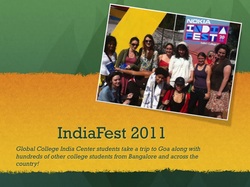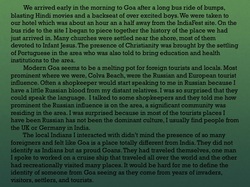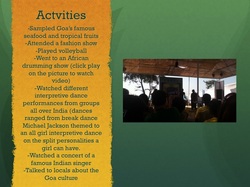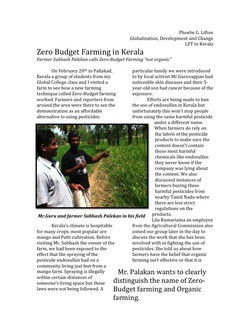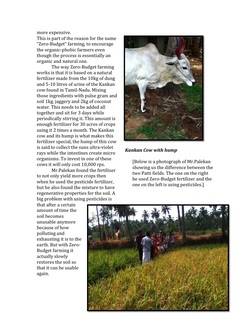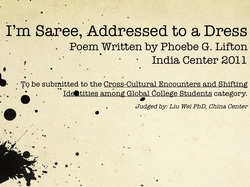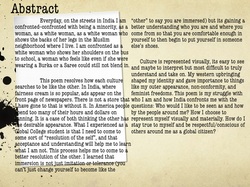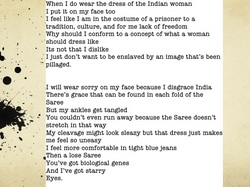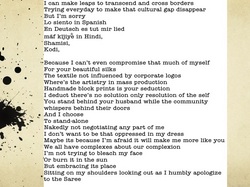Globalization, Development and Change.
Phoebe G. Lifton
Globalization, Development and Change
Response paper
International Women’s Day
“Women hold up half the sky yet they do not inherit the earth” Geeta Menon
In Bangalore on International Women’s day I saw in the newspapers a dedication of their front-page publications to the occasion. Successful business women’s stories, how J-Lo lost weight, and advertisements for ladies night at I-bar where women should, ‘let their inhibitions free,’ were the contents of these articles. Geeta Menon, local activist and occasional guest speaker at the India Center pointed out the complex hierarchy system within what the media and the women perpetuate about themselves. She told us of how recently in Delhi the newspaper reported on a fashion show and will advertise the beauty image of a woman yet at the same time in Rajasthan a mother is beaten to death on the same day for asking what had happened to her son who got hurt for entering a temple.
She explained the fault in the women empowerment movement in India having no sisterhood. That not only do women have the strong patriarchal system and traditions to work against them but they also have no support from each other within the caste system. These women of upper castes are being advertised in the newspaper as role models. They are the strong women in this society but she is only able to reach this point in her career because of the name she comes from.
Problems within the women’s empowerment movement include the dowry system which many people will say does not exist anymore but, in my experience, outside the urban spaces in Rajasthan and Kerala dowry is still a practiced tradition. My host brother in Kerala told me about how he, “lost his girlfriend”, recently because the girls father ‘didn’t think his family fit’ for marriage to him. He spoke about how families demand gold and TV’s when marrying off their daughters. Issues with property rights in the legal system and pregnancy leave from work for the women who do have jobs are still being fought for, especially those in lower castes.
The value and importance of the family structure is the biggest issue when it comes to empowering women. It confines a woman so much that change is stagnant and because women are the natural transmitters of this tradition within the rigid patriarchal system generations are making no progress. I wondered why the women who do want equality and respect for themselves and all other women don’t teach their son’s to give this respect? If women are so revered in the home and are, as I have heard some men in this culture call it, ‘better made for rearing children’, then why don’t they use their position and authority in the family to create consciousness in the new generations to make change?
I am left with questions like these. I know that change is happening for women in India but slowly. Later that day I saw Geeta and different women of all ages gather on the steps of Town Hall in Bangalore city to protest fair and adequate pregnancy leave as well as other fundamental rights they felt they deserved. Faces uncovered, voices shouting together and over a microphone these were some women who did stand together.
Globalization, Development and Change
Response paper
International Women’s Day
“Women hold up half the sky yet they do not inherit the earth” Geeta Menon
In Bangalore on International Women’s day I saw in the newspapers a dedication of their front-page publications to the occasion. Successful business women’s stories, how J-Lo lost weight, and advertisements for ladies night at I-bar where women should, ‘let their inhibitions free,’ were the contents of these articles. Geeta Menon, local activist and occasional guest speaker at the India Center pointed out the complex hierarchy system within what the media and the women perpetuate about themselves. She told us of how recently in Delhi the newspaper reported on a fashion show and will advertise the beauty image of a woman yet at the same time in Rajasthan a mother is beaten to death on the same day for asking what had happened to her son who got hurt for entering a temple.
She explained the fault in the women empowerment movement in India having no sisterhood. That not only do women have the strong patriarchal system and traditions to work against them but they also have no support from each other within the caste system. These women of upper castes are being advertised in the newspaper as role models. They are the strong women in this society but she is only able to reach this point in her career because of the name she comes from.
Problems within the women’s empowerment movement include the dowry system which many people will say does not exist anymore but, in my experience, outside the urban spaces in Rajasthan and Kerala dowry is still a practiced tradition. My host brother in Kerala told me about how he, “lost his girlfriend”, recently because the girls father ‘didn’t think his family fit’ for marriage to him. He spoke about how families demand gold and TV’s when marrying off their daughters. Issues with property rights in the legal system and pregnancy leave from work for the women who do have jobs are still being fought for, especially those in lower castes.
The value and importance of the family structure is the biggest issue when it comes to empowering women. It confines a woman so much that change is stagnant and because women are the natural transmitters of this tradition within the rigid patriarchal system generations are making no progress. I wondered why the women who do want equality and respect for themselves and all other women don’t teach their son’s to give this respect? If women are so revered in the home and are, as I have heard some men in this culture call it, ‘better made for rearing children’, then why don’t they use their position and authority in the family to create consciousness in the new generations to make change?
I am left with questions like these. I know that change is happening for women in India but slowly. Later that day I saw Geeta and different women of all ages gather on the steps of Town Hall in Bangalore city to protest fair and adequate pregnancy leave as well as other fundamental rights they felt they deserved. Faces uncovered, voices shouting together and over a microphone these were some women who did stand together.
Phoebe G. Lifton
Globalization, Development, and Change
Response Paper
A Person Who Has a Disability in Their Body
What kind of system doesn’t marginalize and stereotype people?
Democracy?
I have found hypocrisy in the philosophies of our society
Like when he was talking about globalization and said that greed was just another word for ambition
This is like saying war is another means of population control
Or using pesticides as a new form of birth control
In a society where a woman goddess sits in stone covered in flower peddles, men praying to her on their knees
Where she is worshipped
She is also afraid to leave her house after 5:30pm
Or show her face in front of her husband
Religion discriminates against disabled people
How?
How is a person in a wheel chair supposed to go to church, temple, or mosque and kneel down and pray?
Karma, the Indian belief says that someone with a disability must have done something wrong in their past lives to deserve their current condition
It’s their “condition”
Language is sexist, racist, and all to relative
If you want to be sensitive then change your slang
When you name you shame
We put ourselves in these boxes and live in them
Black houses, White houses, the poor house, the too fat house, the straight House, my house has wifi, mi casa es Hispanic como su casa, the houses we make in each other
We make “the other” objects of charity
The beggars
The homeless
The religious
The uneducated
The 3rd world
Tibetans
How does a community in exile preserve their culture?
How do they maintain their original identity if the very origin that defines them is taken away? Do they sell it? Do only those who are well off enough to settle somewhere else keep the culture going? And what about those left in Tibet, are they just left to struggle through the slow genocide like the other
Indigenous, Natives, Tribals, and Indians
I have even heard someone say, “look at that primitive” as a description
And then theirs women
Gays, lesbians, transgender people
The environment and animals
If your not marginalized then you’re homogenized
I wrote this poem after I sat in on one of St. Joseph’s sessions with Mr. Pavan Kumar Muntha called, “A critique on culture: questions on rights of citizens with disabilities”. It made me think about how those marginalized by society are treated within Bangalore’s urban space. He gave examples of how the buses are inaccessible to people in wheelchairs, women in saree’s have to jump, and the streets to blind people are almost unwalkable, how the commissioner’s office isn’t even accessible to persons with disabilities. It made me see the city in a totally different perspective. Often times I get so involved with figuring out how to get where I am going in the huge city that I forget who hard it must be for those, how Mr. Pavan Kumr Muntha explained it, are barely recognized as citizens. Then I got to thinking about all the ignored parts of society and found that the amount that society serves ends up being the minority rather than the majority.
Globalization, Development, and Change
Response Paper
A Person Who Has a Disability in Their Body
What kind of system doesn’t marginalize and stereotype people?
Democracy?
I have found hypocrisy in the philosophies of our society
Like when he was talking about globalization and said that greed was just another word for ambition
This is like saying war is another means of population control
Or using pesticides as a new form of birth control
In a society where a woman goddess sits in stone covered in flower peddles, men praying to her on their knees
Where she is worshipped
She is also afraid to leave her house after 5:30pm
Or show her face in front of her husband
Religion discriminates against disabled people
How?
How is a person in a wheel chair supposed to go to church, temple, or mosque and kneel down and pray?
Karma, the Indian belief says that someone with a disability must have done something wrong in their past lives to deserve their current condition
It’s their “condition”
Language is sexist, racist, and all to relative
If you want to be sensitive then change your slang
When you name you shame
We put ourselves in these boxes and live in them
Black houses, White houses, the poor house, the too fat house, the straight House, my house has wifi, mi casa es Hispanic como su casa, the houses we make in each other
We make “the other” objects of charity
The beggars
The homeless
The religious
The uneducated
The 3rd world
Tibetans
How does a community in exile preserve their culture?
How do they maintain their original identity if the very origin that defines them is taken away? Do they sell it? Do only those who are well off enough to settle somewhere else keep the culture going? And what about those left in Tibet, are they just left to struggle through the slow genocide like the other
Indigenous, Natives, Tribals, and Indians
I have even heard someone say, “look at that primitive” as a description
And then theirs women
Gays, lesbians, transgender people
The environment and animals
If your not marginalized then you’re homogenized
I wrote this poem after I sat in on one of St. Joseph’s sessions with Mr. Pavan Kumar Muntha called, “A critique on culture: questions on rights of citizens with disabilities”. It made me think about how those marginalized by society are treated within Bangalore’s urban space. He gave examples of how the buses are inaccessible to people in wheelchairs, women in saree’s have to jump, and the streets to blind people are almost unwalkable, how the commissioner’s office isn’t even accessible to persons with disabilities. It made me see the city in a totally different perspective. Often times I get so involved with figuring out how to get where I am going in the huge city that I forget who hard it must be for those, how Mr. Pavan Kumr Muntha explained it, are barely recognized as citizens. Then I got to thinking about all the ignored parts of society and found that the amount that society serves ends up being the minority rather than the majority.
